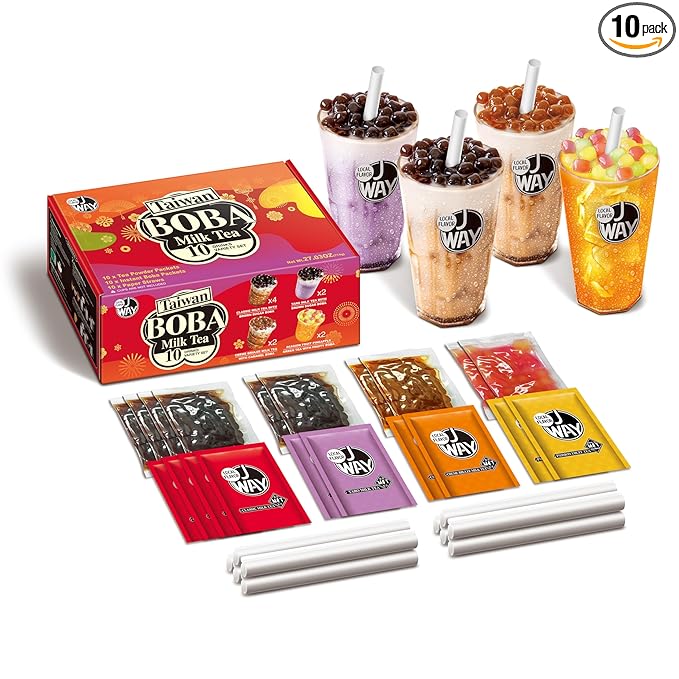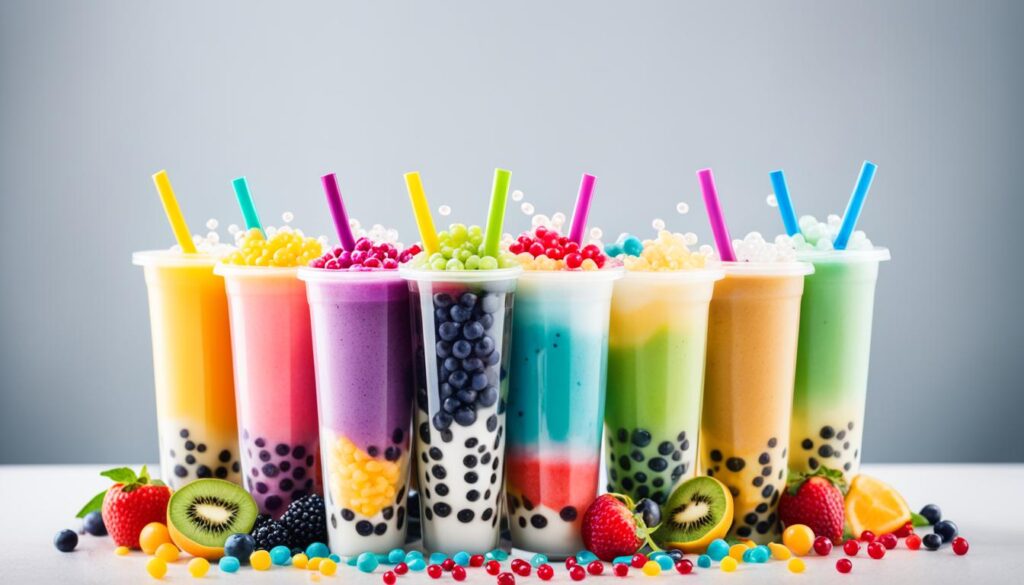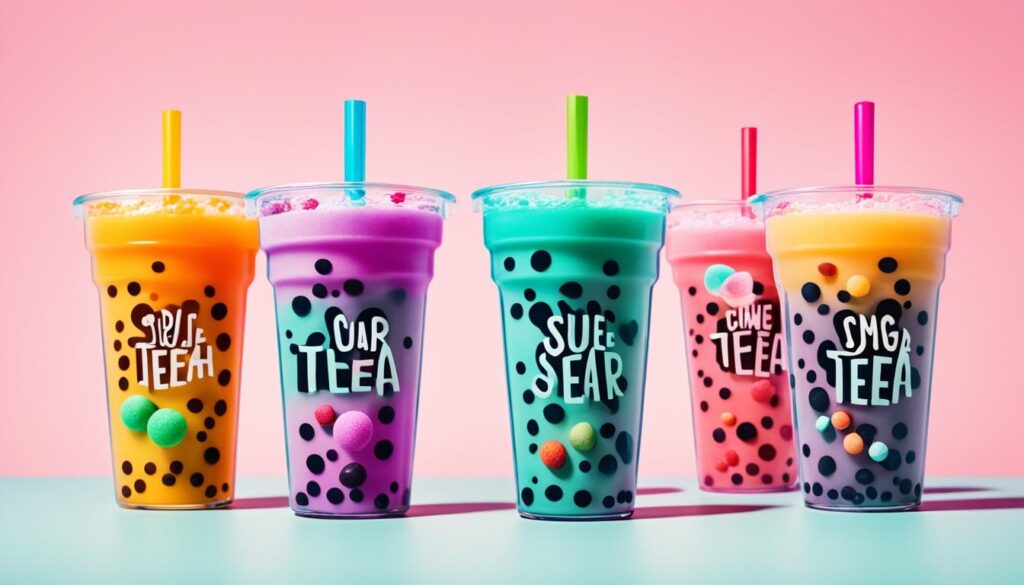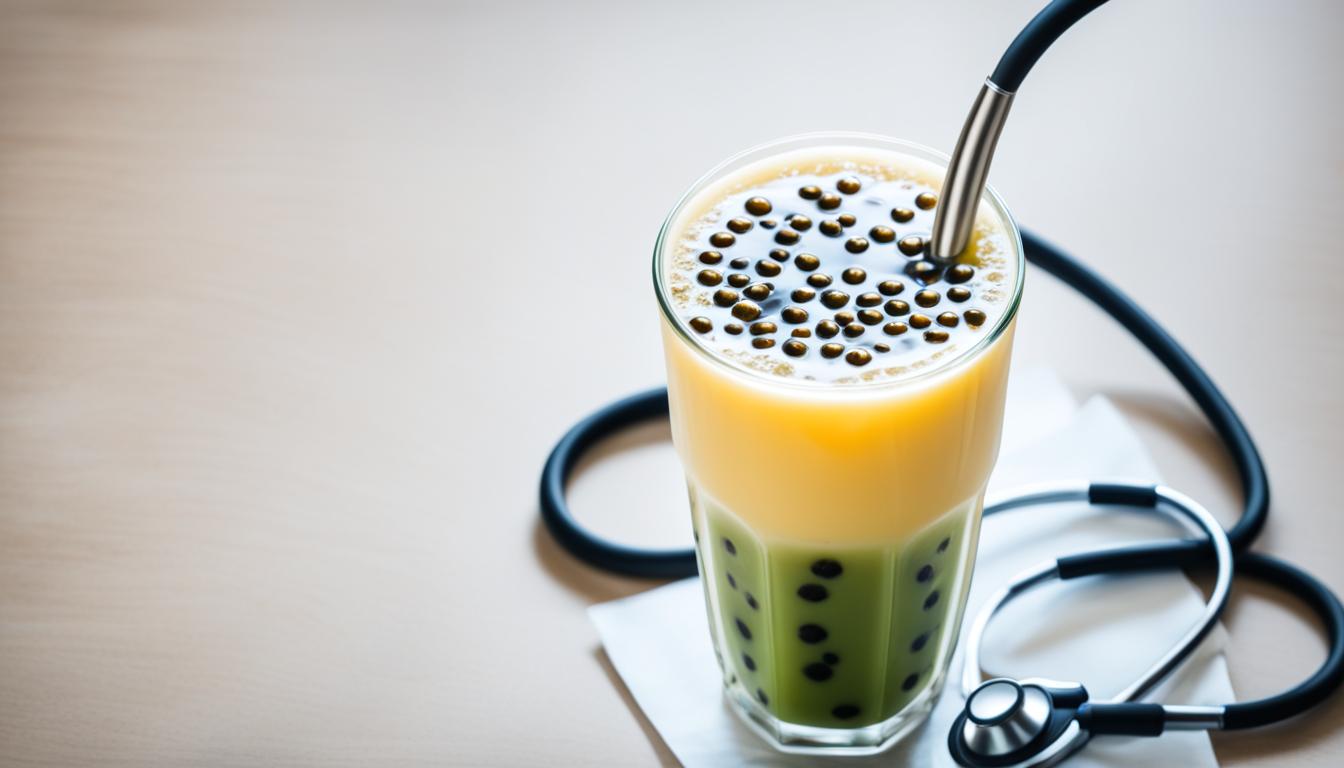“As an Amazon Associate I earn from qualifying purchases.” .

Instant Boba Bubble Pearl Variety Milk Fruity Tea Kit
Dear reader,
Have you ever found yourself craving a deliciously satisfying drink that brings a burst of joy to your taste buds? For many of us, that perfectly describes our experience with boba tea. The whimsical combination of chewy tapioca pearls, refreshing tea, and delightful flavors can create a delightful sensory experience like no other. But amidst the sheer pleasure of sipping on a cup of boba, is it truly a healthy choice?
This is indeed a burning question in the minds of boba enthusiasts like you and me. As someone who has relished the unique charms of boba tea on countless occasions, I was compelled to delve deeper into the truths behind its health profile. In doing so, I hope to shed light on the matter and help you make informed decisions about this beloved beverage.
Through careful research and analysis, we will explore the nutritional value, debunk misconceptions, and examine the potential health risks associated with consuming boba tea. Armed with this knowledge, you’ll be empowered to enjoy your favorite drink in a manner that aligns with your wellness goals.
So, join me on this enlightening journey as we uncover the truth about boba tea and its impact on our health. Let’s set aside the myths and misconceptions to reveal the hidden realities of this enticing beverage. Together, we’ll navigate the labyrinth of information and emerge with a clear understanding of whether boba truly deserves a spot in our healthy lifestyle.
Is Boba Healthy? Key Takeaways:
- Bobba tea is a beloved beverage known for its sweet, chewy tapioca pearls and variety of flavors.
- There are many misconceptions surrounding the healthiness of boba tea that need to be debunked.
- The nutritional value of bubble tea can vary depending on the ingredients used, such as black or green tea, milk, sugar syrup, and fruit flavors.
- Bobba tea can be enjoyed as part of a healthy lifestyle when consumed in moderation with thoughtful choices.
- By making informed decisions, we can savor the delights of boba tea while nurturing our well-being.
Debunking Misconceptions about Boba Tea
There are several misconceptions surrounding boba tea that need to be addressed. Let’s uncover the truth and set the record straight.
Tapioca Pearls: Not Gelatine, but Cassava Root
One common misconception about boba tea is the origin of tapioca pearls. Contrary to popular belief, these chewy pearls are not made with gelatine. Instead, they are derived from cassava root, which is a starchy crop. Tapioca pearls undergo a process that transforms them into the chewy texture loved by boba enthusiasts.
Popping Boba: Bursting with Real Fruit Juice
Another popular topping in boba tea is popping boba, which adds a burst of flavor with every bite. However, there is a misconception that these colorful pearls contain harmful chemicals. In reality, popping boba is made with real fruit juice or natural flavorings, ensuring a delightful and refreshing experience without any artificial ingredients.
Adjustable Sugar Level: Personalize Your Taste
One of the great things about bubble tea is its customizable nature, and that includes the sugar level. While bubble tea can be sweetened generously, the amount of sugar can be adjusted to suit your personal preference. Whether you prefer it subtly sweet or sugar-free, you have the flexibility to enjoy your boba tea just the way you like it.
Caffeine Content: Not Just for the Young
There is a common misconception that bubble tea is only enjoyed by the younger demographic. The truth is that people of all ages indulge in this flavorful beverage. Furthermore, not all bubble teas contain caffeine. There are plenty of caffeine-free options available for those who prefer to avoid it or enjoy bubble tea later in the day without any sleep disruptions.
The Nutritional Value of Bubble Tea
Bubble tea is a beverage that offers a wide range of flavors and toppings, making it a favorite among tea enthusiasts. But what about its nutritional content? Let’s explore the key ingredients that contribute to the nutritional value of bubble tea.
The Base: Black and Green Tea
Both black tea and green tea are commonly used as the base for bubble tea. Aside from their distinct flavors, these teas are rich in antioxidants that can improve overall health. Antioxidants help reduce inflammation and lower the risk of chronic diseases, making bubble tea a potentially beneficial choice.
Milk for Added Nutrients
Many bubble tea recipes include milk, which adds creaminess and richness to the beverage. Milk is an excellent source of calcium, which promotes strong bones and teeth. However, it’s essential to note that non-dairy alternatives may not offer the same level of nutrients. If you choose a non-dairy option, make sure to check its nutritional content.
Sweeteners: Finding a Healthier Option
The sweetener used in bubble tea can significantly impact its nutritional profile. Many bubble tea shops use sugar syrups like fructose, which adds calories and sugar. To make your bubble tea healthier, consider choosing alternative sweeteners like honey or agave. These natural sweeteners provide a more wholesome option without sacrificing flavor.
Toppings and Flavors: A Matter of Choice
The nutritional value of bubble tea can also be influenced by the toppings and flavors added to it. While some toppings, such as fruit flavors, can provide additional vitamins and minerals, others may be higher in sugar and calories. It’s important to be mindful of your choices and opt for healthier alternatives whenever possible.

The Nutritional Value of Bubble Tea: A Summary
When it comes to the nutritional content of bubble tea, it’s all about balance and informed choices. While black and green tea offer antioxidants, milk adds calcium, and toppings can provide additional flavor and nutrients, it’s crucial to consider the overall sugar and calorie content. By making conscious decisions about sweeteners, milk choices, and toppings, you can enjoy bubble tea as part of a balanced diet.
Calorie Count and Healthier Alternatives
The calorie content of bubble tea can vary depending on the ingredients used. Traditional black or green bubble tea with tapioca pearls can contain 300-400 calories, while fruity versions can have even more due to added sugars. Milk or creamer adds significant fat and sugar, and the tapioca pearls themselves are high in carbohydrates and calories.
However, there are ways to make bubble tea healthier, such as opting for dairy-free options or alternative sweeteners like honey or stevia. Choosing healthier toppings like fresh fruits and avoiding artificial flavorings can also reduce the calorie count.
By making these simple swaps and choices, you can still enjoy your favorite bubble tea while keeping an eye on your calorie intake and opting for more nutritious alternatives. Below is a table outlining the calorie content and healthier alternatives for various bubble tea ingredients:
| Ingredient | Calorie Count | Healthier Alternative |
|---|---|---|
| Traditional Black or Green Tea | 300-400 calories | Herbal tea or unsweetened tea |
| Tapioca Pearls | High in carbohydrates and calories | Chia seeds or jelly cubes |
| Milk or Creamer | Fat and sugar content | Dairy-free milk alternatives or light creamer |
| Added Fruit Syrups or Sweeteners | Additional calories from sugar | Honey, stevia, or natural fruit purees |
| Toppings with Artificial Flavorings | No nutritional value | Fresh fruits or nuts |
By being mindful of your choices and opting for healthier alternatives, you can enjoy bubble tea without the guilt and still indulge in its delicious flavors.
Health Risks of Consuming Bubble Tea
While bubble tea is a delicious and refreshing beverage, it is essential to be aware of the potential health risks associated with its consumption. One significant concern is the high sugar content found in many bubble tea variations. Excessive sugar intake can contribute to obesity, type 2 diabetes, and heart disease.
In addition, some bubble teas contain artificial additives such as food dye and artificial sweeteners. These additives, when consumed in large quantities, can potentially have negative effects on your health.
It is always advisable to choose bubble teas that use natural ingredients whenever possible. Opting for beverages made with real fruits or natural flavorings instead of artificial additives can help minimize potential health risks.

Understanding Sugar Content in Bubble Tea
The sugar content in bubble tea can vary depending on the ingredients and customization options chosen. To make an informed decision about the sugar content in your bubble tea, consider factors such as:
- The sweetness level of the tea base
- The type and amount of sweeteners added
- Additional syrups or flavorings
- Toppings like boba pearls or popping boba
If you are concerned about the sugar content in your bubble tea, consider asking for less syrup or opting for unsweetened varieties. Substituting natural sweeteners like honey or agave syrup can also be a healthier alternative.
Tip: Be mindful of your overall sugar intake throughout the day and balance it with other nutritious meals and snacks.
Artificial Additives and Sweeteners in Bubble Tea
Some bubble tea shops use artificial additives such as food dye and artificial sweeteners to enhance the flavors or create unique visual effects. While consuming these additives in moderation may not pose significant risks, it is advisable to choose bubble teas that prioritize natural ingredients.
Artificial sweeteners, in particular, can have potential adverse effects when consumed in large quantities. These sweeteners may be associated with health concerns such as digestive issues or an increased craving for sweets.
When enjoying bubble tea, consider asking your bubble tea shop about the ingredients used and their policies on artificial additives. Opting for bubble teas that use natural ingredients can provide a healthier and more enjoyable experience.
Choosing Natural Ingredients for a Healthier Option
When ordering bubble tea, look for options that prioritize natural ingredients and avoid unnecessary additives. Some tips for choosing a healthier bubble tea include:
- Opting for unsweetened or minimally sweetened tea bases
- Choosing fresh fruit toppings or real fruit juice-based add-ons instead of artificial flavorings
- Requesting reduced or no sugar syrup
- Considering dairy-free or plant-based milk alternatives
By making these choices, you can enjoy bubble tea while minimizing your consumption of artificial additives and reducing your overall sugar intake.
| Bubble Tea Choices | Health Impact |
|---|---|
| Bubble tea with natural ingredients and minimal sugar | Healthier option with reduced sugar content and fewer artificial additives |
| Bubble tea with artificial additives and excessive sweeteners | Potentially higher sugar content and increased health risks |
Boba Tea as Part of a Healthy Lifestyle
While enjoying bubble tea, it’s important to exercise moderation due to its high sugar and calorie content. However, this doesn’t mean you have to completely forgo this delicious beverage. By considering your dietary needs and making conscious choices when it comes to toppings, flavorings, and sweeteners, you can still enjoy boba tea as part of a healthy lifestyle.
Customizing your bubble tea allows you to control the amount of sugar and calorie intake. Opting for healthier alternatives such as low-sugar or sugar-free sweeteners can help reduce the overall calorie content. Experimenting with natural flavorings like fresh fruit or herbal infusions can also add a burst of flavor without the need for additional sweeteners.
When it comes to toppings, choose wisely. While boba pearls are a signature element of bubble tea, they are high in carbohydrates and calories. Consider opting for healthier alternatives such as chia seeds, which provide beneficial omega-3 fatty acids and fiber. Fresh fruit toppings not only add a pop of color but also provide essential vitamins and minerals.
Remember that balance is key. Enjoying boba tea as an occasional treat can be a part of your overall healthy lifestyle. Making mindful choices about your bubble tea’s ingredients and portion sizes can help minimize the negative health effects and allow you to indulge in this delightful beverage guilt-free.
“Bubble tea can still be enjoyed in a healthy way by customizing it with natural flavorings, low-sugar sweeteners, and healthier toppings.”
Tips for Enjoying Boba Tea in a Healthy Way
- Choose lower-sugar or sugar-free sweeteners to reduce calorie intake.
- Experiment with natural flavorings like fresh fruit or herbal infusions.
- Opt for healthier toppings such as chia seeds or fresh fruits.
- Control portion sizes and enjoy bubble tea in moderation.
- Consider bubble tea as a treat rather than a daily beverage choice.
By incorporating these tips into your bubble tea experience, you can savor this delightful beverage while staying mindful of your calorie intake and dietary needs.
Conclusion
In conclusion, bubble tea can be a delicious and enjoyable beverage that can be part of a balanced diet when consumed in moderation and with thoughtful choices. The misconceptions surrounding the healthiness of bubble tea have been debunked, highlighting the importance of considering factors such as sugar content, toppings, and flavorings when enjoying this popular drink.
By making informed decisions, you can confidently indulge in bubble tea without compromising your health. Opting for lower sugar options, choosing natural ingredients, and customizing your bubble tea to suit your dietary needs are all important tips for enjoying bubble tea while making healthier choices.
Remember, moderation is key. Make bubble tea an occasional treat rather than an everyday habit and be mindful of your overall calorie intake. With these tips in mind, you can savor the flavors and unique experience of bubble tea while still prioritizing your health and well-being.
FAQ
Is boba tea healthy?
What are some misconceptions about boba tea?
What is the nutritional value of bubble tea?
How many calories does bubble tea contain?
What are the health risks of consuming bubble tea?
Can bubble tea be part of a healthy lifestyle?
“As an Amazon Associate I earn from qualifying purchases.” .



